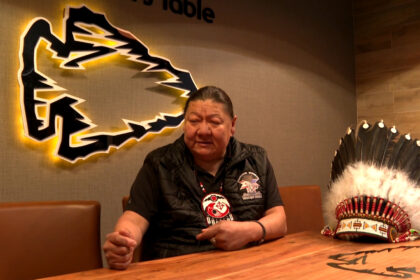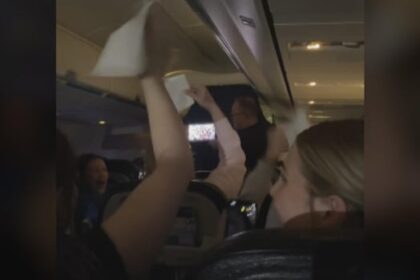A Canadian visa program set up to fast track educated immigrants from Hong Kong appears to have been systematically abused by applicants accused of using ghostwriters or plagiarism to obtain academic credentials.CBC News has found at least seven Federal Court decisions involving applicants rejected for misrepresentation, after immigration officers grilled them about hastily issued diplomas and master’s degrees obtained with scant schoolwork and suspicious essays.The accused scammers allegedly took advantage of a unique program designed to attract educated Hong Kong citizens in the wake of a Chinese crackdown in 2020 — but experts say the cases also highlight problems with diploma mills and education fraud within Canada.According to court records, the situation resulted in — at times — almost comical interviews, where visa officers grilled would-be immigrants who turned out to know next to nothing about their credentialed areas of expertise.”It’s always a problem when you create a program. Large numbers will qualify but some people in that net are bad people and they’ve done bad things to get their eligibility,” said Richard Kurland, a Vancouver-based immigration lawyer who acted in some of the Federal Court cases.”How do you distinguish between the good people who really qualify, and the bad people who paid money to give the appearance of qualification? It’s an administrator’s nightmare.”An offer of ‘homework guidance’Former immigration minister Marco Mendocino announced special measures to speed up permanent residence applications from Hong Kong in November 2020, after China introduced a national security law decried by protestors as an attack on individual rights and freedoms.The Federal Court cases all involve Hong Kong residents who applied for open work permits according to guidelines that said they had to have graduated within the past 10 years with a diploma, degree or doctorate from a Canadian school or international equivalent.Immigration lawyer Richard Kurland says the scandal arose after Immigration, Refugees and Citizenship Canada introduced a special program in 2020 targeting educated immigrants from Hong Kong. (Richard Grundy/CBC)The credential had to be OK’d by a recognized accreditation body.The South China Morning Post flagged abuse of the program in January 2022 in an exclusive article titled “Hongkongers keen to move to Canada offered MBAs for cash, without classes or homework.”In the wake of Mendocino’s announcement, the article claimed “dozens of emigration and education consultancy firms in Hong Kong have offered packages for applicants to obtain postgraduate and masters’ degrees from accredited British universities.”Posing as a potential client, a reporter found five firms promising qualifications in exchange for thousands of dollars and the option of “‘homework guidance,’ meaning all assignments would be done and clients would be guaranteed a pass.”‘You answered all, if not most, of my questions wrong’According to the Federal Court cases, immigration officers in Hong Kong cited the article in subsequent interviews with applicants boasting credentials from the two British universities named in the report: Anglia Ruskin University and the University of Chichester.In one case, applicant Wai Ka Yip wrote to Immigration, Refugees and Citizenship Canada (IRCC) proactively to say that as “a legitimate MBA graduate from the University of Chichester” he was concerned about “recent news” and “should not be penalized by the actions of others.”As part of her immigration application, Lai Man Lam submitted a masters of business administration from Anglia Ruskin University. But a visa officer accused her of using a ghostwriter to complete her coursework. (Federal Court of Canada)The officer who rejected Yip said his credentials might be genuine, but he questioned whether Yip “legitimately obtained the diplomas” because of concerns including “large scale copying of coursework” and “Yip’s inability to demonstrate basic knowledge of his studies.”Lai Man Lam faced similar scrutiny over the Master of Business Administration she obtained from Anglia Ruskin University in October 2022 on the strength of an essay which an immigration officer pointed out was submitted on the same day she graduated.”Does that seem weird to you?” the officer asked, according to a transcript of their conversation filed with the court.”I have concerns that you are among the group who have hired ghostwriters, either via agents or by yourself and have misrepresented by presenting this credential as if you legitimately obtained it,” the officer said.”I did the work myself,” Lam insisted.”I didn’t expect you to answer all my questions right,” the officer continued. “But you answered all, if not most, of my questions wrong.”Problem fixed?In separate statements to CBC News, both the University of Chichester and Anglia Ruskin University said graduates have to meet high academic standards subject to external examiners. Anglia Ruskin said the school does not work with immigration consultancy agencies and will take “prompt action” against anyone misusing the university’s name and qualifications.Protesters against the new national security law march on the anniversary of Hong Kong’s handover to China from Britain in Hong Kong, Wednesday, July 1, 2020. (Vincent Yu/AP)The University of Chichester said it terminated a relationship with a Hong Kong-based school following the appearance of the South China Morning Post article.Kurland, who was not speaking to CBC News on behalf of clients in any of the cases, said it’s unclear how many people took advantage of the program — the cases that have come to light only surfaced in recent months because of applicants who appealed their rejections all the way to Federal Court.”The Hong Kong media reported hundreds were involved in this scheme. However that doesn’t mean hundreds were doing the wrong thing,” he said.Kurland says he believes the government has since fixed the problem. In August 2023, the government removed an educational requirement for Hong Kong citizens within Canada applying for permanent residence — but an IRCC spokesperson said the decision was unrelated to the cases of fraud.The department did not comment on the specifics of the Hong Kong fraud cases, but said IRCC has proposed new rules that would levy fines of up to $1.5 million against anyone counselling would-be immigrants to misrepresent themselves.’People say this doesn’t happen in Canada’University of Calgary professor Sarah Eaton says the implications of the fraud go well beyond Hong Kong and a special program designed to lure educated immigrants to Canada.Eaton, an expert on academic ethics, has written extensively about essay and diploma mills and the multi-billion-dollar global industry known as “contract cheating.”University of Calgary professor Sarah Elaine Eaton says Canada is behind countries like Australia and the United Kingdom when it comes to cracking down on contract cheating. (Submitted by Sarah Elaine Eaton)”When a student crosses a stage and receives a parchment, we as a society believe that the parchment they receive represents the learning they’ve done in their program,” she says. “And if they haven’t done the learning in the program, we can’t trust the parchment. We can’t trust the credential.”Eaton says countries like Australia and the United Kingdom have taken strong stances against credential fraud, with Australia going so far as to make it a criminal offence to supply academic cheating services.But she says Canadian politicians — despite expressing outrage over private institutions exploiting international students — have shown little interest in keeping track of contract fraud or of bringing in legislation specifically designed to prevent it.”I’ve heard people say this doesn’t happen in Canada — people don’t believe Canada is a corrupt enough country where these sort of things happen — I’ve heard people say it’s too resource intensive to address it. I’ve heard things like, ‘Oh, it’s a one-off,” said Eaton.”I can see Canada as being a very attractive destination for individuals with what I might call questionable credentials, because of the lack of guardrails, because of the lack of systems and processes to verify credentials of incoming individuals in all kinds of different pathways.”The right to ‘go behind’ academic credentials?Many of the Federal Court cases centred on the limits of a visa officer’s right to “go behind” an academic credential to assess whether it had been obtained with the help of a ghostwriter.Rejected applicants argued immigration officers lacked knowledge, expertise or jurisdiction to judge their educational accomplishments.But a string of judges ruled against them, with one writing the applicants were “essentially arguing that visa officers must take educational credentials at face value.”Steven Meurrens, a Vancouver-based immigration lawyer and podcaster, says it’s rare for immigration officers to dig into academic credentials — despite the fact educational qualifications boost an immigrant’s chances of gaining admission to Canada.”So far, it’s limited to [Hong Kong] and that one program,” he said. “Whether it emboldens officers elsewhere remains to be seen.” Meurrens says trying to keep track of education fraud arising from overseas educational consultants and institutions would be difficult “outside of a widespread scandal like this.”
Ghostwriters and plagiarism alleged as Hong Kong residents flunk immigration applications











